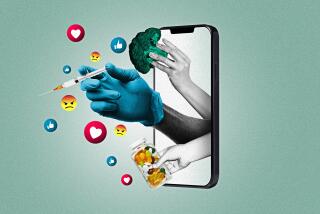Buyer, beware of SARS in sales pitches
- Share via
Pills, herbs, air purifiers and other products are being offered up with either the implicit or explicit claim that they can help protect people against severe acute respiratory syndrome, or SARS, the potentially fatal disease that has killed more than 500 people worldwide.
Such assertions should be greeted with a dose of skepticism, infectious disease specialists say. It is highly unlikely that any of these products have been specifically tested for SARS, they point out. “We haven’t found any vitamins, herbs or other product that can prevent the common cold,” said Dr. David Mushatt, an associate professor of infectious diseases at Tulane University in New Orleans. “It’s highly doubtful any of those could stop SARS.”
The public may be especially vulnerable to such advertising now. Recent fears of bioterrorist attacks, which a few months ago led to a run on hardware stores for duct tape and plastic sheets, are still fresh in people’s minds. And almost daily reports of SARS deaths coupled with images of people in Asia donning surgical masks have done little to calm rattled nerves.
Those fears are fueling the spate of recent marketing of SARS-related goods. A pill promising to boost the body’s immune system, air purifiers trumpeting their ability to provide germicidal protection and so-called SARS survival kits featuring a mask and rubber gloves are all being promoted. “There’s a lot of hype,” said Dr. John Sensakovic, associate dean of the School of Graduate Medical Education at Seton Hall University. “I just hope these items don’t give people a false sense of security.”
Aware of the potential for misrepresentation, the American Herbal Products Assn., an industry trade group, recently urged its member companies not to claim that dietary supplements can protect against SARS. “We do not believe there are any dietary supplements that have been shown to prevent or treat SARS,” the group said in a statement.
But some marketers of other products are not backing off. Stan Weinberg, head of Los Angeles-based Wein Products Inc., recently said that the SARS scare has increased the sales of the Mini Mate device by 500%.
Originally, the 1.5-ounce pager-sized device worn around the neck was developed to ward off allergies and asthma attacks, but after the SARS outbreak, the company began touting the product’s ability to create “a toxic particle exclusion zone in front of the wearer’s mouth, nose and eyes” as a shield against the disease. As of last week, the company’s Web site promoted use of the device against SARS, while also pointing out that it doesn’t guarantee 100% protection against viral or bacterial infection. “People try to make me out a robber baron or profiteer,” said Weinberg. “But it’s still American to make a profit.”
Even if air and personal space purifiers could eliminate all airborne viruses, they still wouldn’t be enough to stop SARS, experts say. The illness can be easily transmitted from surfaces like doorknobs, bathroom faucets and other inanimate objects on which the virus can linger for hours. For example, a passenger sitting next to a SARS-infected person on an airplane might not contract the disease, while another person using the same restroom faucet as the infected person might, according to Dr. Peter Katona, an infectious disease specialist at UCLA. “I have very little faith any kind of air purifier would make any real difference,” he said.
Instead, experts recommend more concrete measures to help protect against SARS. First, travel to China, Singapore or other areas where the disease has spread should be avoided. “The most important thing people can do I think is for them to wash their hands regularly,” Mushatt said.
More to Read
Inside the business of entertainment
The Wide Shot brings you news, analysis and insights on everything from streaming wars to production — and what it all means for the future.
You may occasionally receive promotional content from the Los Angeles Times.










